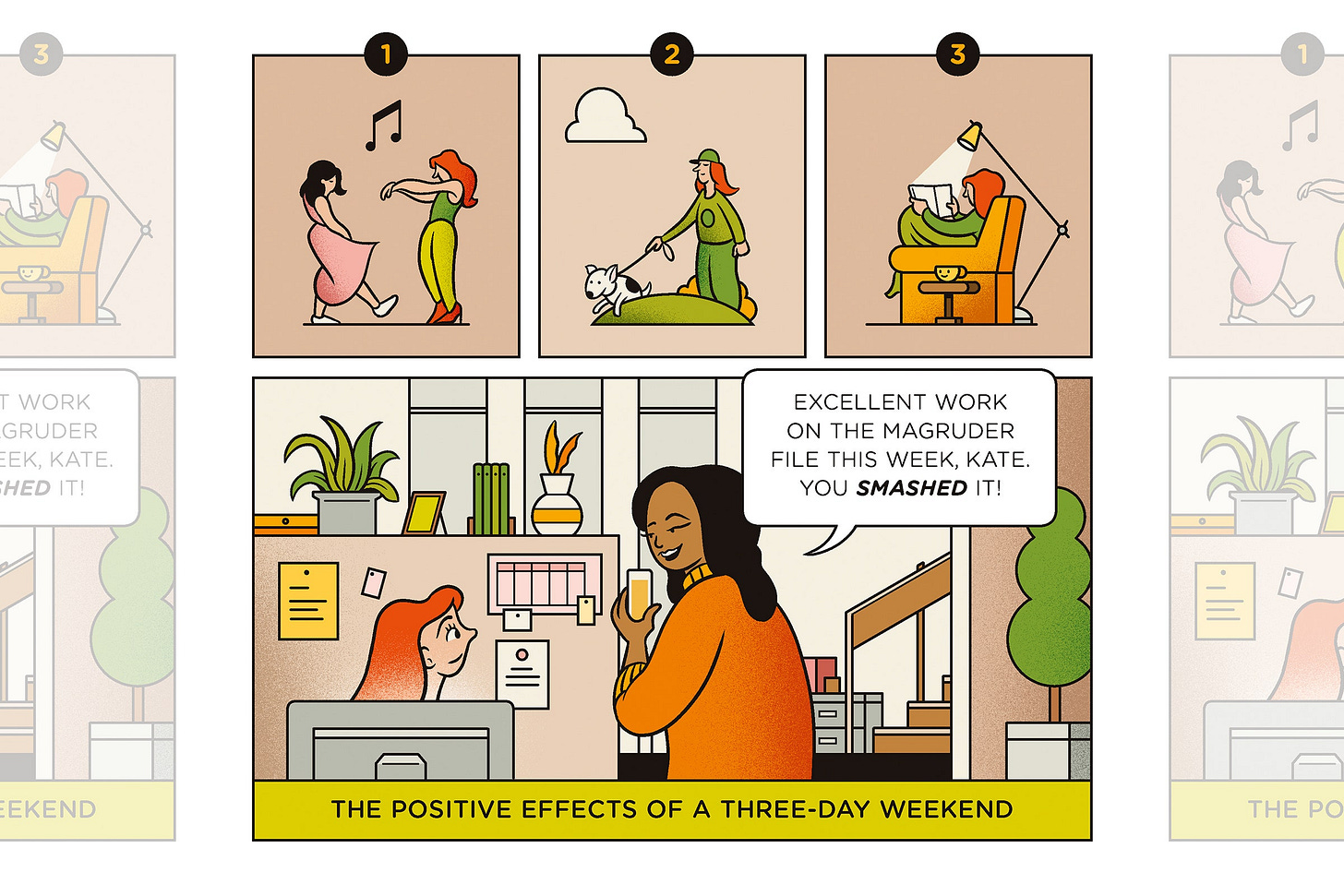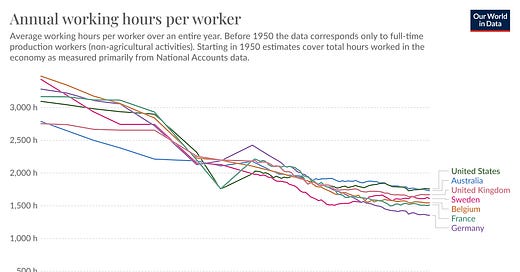Why can't every weekend be a long weekend?
Working 5 days a week is outdated — it's time for a change.
Delayed delivery because I was sick on Tuesday 📩 but I’m on the mend now!
The 40-hour work week is nearly a hundred years old.
On May 1, 1926, Henry Ford popularized the 40-hour work week after he discovered through his research that working more yielded only a small increase in productivity that lasted a short period of time.
This change from an 80-100 hour work week in 1940 came roughly a hundred years after the Industrial Revolution. Since 1817, people have been advocating for better working conditions. Eventually, Ford was the first to realize that allowing his employees to work fewer hours, take a couple of days off for rest, and paying them a fair wage actually boosted productivity. In fact, along with introducing the 40-hour work week, he doubled his workers' wages from $2.43 for nine hours to $5 per 8-hour day.
I think 100 years in, we're well worth an upgrade to a 4-day work week1 next.
The last time, the reduction in working hours was spurred due to the introduction of machines. Now, we're seeing the use of AI enter our work in a similar vein. Whether welcome or not, AI & independent tech have swiftly been integrated into most industries.
According to Bill Gates, a three-day work week could be possible soon (with the help of AI).
While I love the enthusiasm, it's still a while away since most companies are against a 4-day work week — even if it's still 40 working hours.
Why should we change the 5-day work week anyway?
To put it simply, that's more of your life dedicated to work than 'living.'
Five days in the office2 means that you have only two days to rest, do any pending chores, make & attend any appointments, spend time with your loved ones, and rejuvenate yourself with any hobbies or activities you'd like.
That's never enough time. Most of us get Sunday afternoon blues or hate Monday mornings because we've just not had enough time to ourselves before returning to send yet another email.
Going from 100-hour work weeks to 40-hour work weeks was an amazing development, but it also happened 98 years ago. There was a time when a 40-hour work week allowed you to buy a house & support a family (on one single income).
In addition, the 5-day work week worked back then because there was usually someone at home to do all the other things you need to do to live. Cook lunches & dinners, do laundry, take care of the kids, plan appointments & social meetings, and keep the house clean.
Now, that's not at all possible. Even double-income households with no kids (DINK) find it immensely difficult to keep up with the rising costs of everything. Money aside, working 8 hours a day + commuting to your job takes up at least 10-12 hours daily, leaving you with the bare minimum time to cook, eat, and sleep.
You can forget about doing anything fun or recreational or good for you on work days.
So, to recap: a decreasing ability to buy houses, have kids, or rest properly.
How successful are 4-day work weeks?
Several countries have piloted 4-day work week experiments. People got to work for 32 hours without a decrease in pay, or they work 40 hours within 4 days.
Either way, the results were overwhelmingly positive. Both for the employees and the employers.
The employees reported decreased stress levels, lowered burnout, and improved personal relationships.
This, in turn, positively affected businesses that saw improved productivity, higher morale and better team culture — plus, they could bring in talented employees more easily and retain their existing ones, too.
In the US & Canada studies, average revenue increased by 15%.
"All the evidence shows that you are more productive in four days rather than five. People almost become more naturally efficient overnight.

tl;dr: The 4-day workweek brings in more money for companies (which is usually the end goal anyway) and a better life-work balance for employees (which is what we all seek anyway).
Ok, so why aren't 4-day work weeks more common?
Well, I think there are roughly two reasons for this.
The first one's control. Most companies are helmed by people who want to extract as much as possible from their employees — without any consideration for their mental/physical health because it means more profit. This also extends to allowing people to work remotely and giving them enough PTO & sick leave. If you give people basic respect, they realise they're worth that and then some more.
It's easier to convince people that work needs to be their first and biggest priority if you keep them sitting in the office for hours at an end, building 'work families' and teams of 'rockstars'. This helps the people at the top make more money and keep their employees tired enough that they don't have any energy or mental space to think about, let alone demand better working conditions.
The other reason 4-day work weeks aren't standard yet is the "We did it this way, and we're fine" mentality.
Most decision-makers have had to work 5 or even 6-day work weeks to get to where they are. Whether they're Gen X, boomers, or even older millennials, they've worked a lot. So it seems unfair to them to let the next generation have it easier with a 4-day work week.
And well, that sucks. Because it should not be necessary to expect people to want better things for others, to make life less hard for their children. Just because we've gone through a difficult time does not mean we can't allow others to have it easier — at least a little.
The 4-day work week3 will become standard, eventually, enough people will ask for it. But it would be great if we didn't have to wait 100 years every time to make working better & easier for ourselves.
After all, to quote Bill Gates, "...the purpose of life is not just to do jobs.4"
For any CEOs or decision-makers reading this, here's Harvard Business Review on running your own 4-day work week experiment. They do recommend a 32-hour work week for higher success rather than condensing 40 hours in 4 days (let people do better work in fewer days, pls).
What did you think of this issue?
Your anonymous feedback helps me improve. Thanks!
If you liked this issue (or like the newsletter in general), feel free to buy me a coffee or two!
Fun links of the week! 🚀
Find out which era your face is from. (May not be the era you're hoping for.)
Enjoying awards season? Here's a fun watch (and here are the 2024 nominees).
Remember: they'll lay you off when they need — your job is just a job.
Terrifying: The rich continue to get richer — the latest Oxfam numbers say that poverty won't be eradicated for another 229 years, while we're going to see the world's first trillionaire likely within the decade. Related: Is it more expensive to be poor than rich?
Me when people ask me why I don't eat breakfast:

Thanks for reading! Please tap the heart if you liked this issue (or like the newsletter in general) so the algorithm overlords take pity on me lol.
Yes, I’m aware asking for a 4-day work week when scores of people are being laid off seems ridiculous. But well, speaking as someone who was also laid off, we have to demand what we’re worth when we can. Even if it’s not opportune or ideal. This way, at least we’re aware of what could be.
The 40-hour/5-day work week is standard on paper, but it’s a fact that most people work way more than that & in several developing countries (and America), work = life, so you could be working 60-80 hour weeks on average without enough PTO or salary to compensate.
The word “work week” looks so odd to me after this post lol.
I’m aware this is also the same person who once considered “sleeping is lazy”, and he’s also extremely privileged to be able to say things like that. But he’s still right — our life’s purpose shouldn’t only be our job.





As someone who works 32 hours over 4 days in my main role at a startup I fully support that this should become the industry norm. We're also remote first, support side hustles and people can choose their own hours and I think we're genuinely building what should be a Harvard Business case study for the future of work. Pretty much every Monday I'm excited to hit the ground running and do important work. Building a world where this is the norm is a cause worth fighting for that unlocks time for people to change the world in other ways.